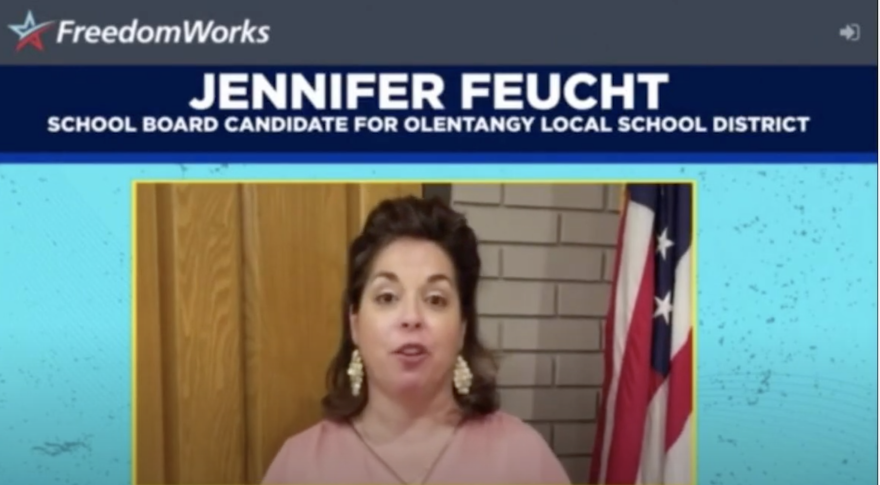Not only are there more candidates running for school boards in Ohio this year, but they are also spending more on their campaigns. And it’s difficult to find out exactly how much more.
Follow the money. That’s the mantra from reporters and good government groups who are trying to understand more about candidates for office. But sometimes, it’s not that easy.
On Sunday, during a forum featuring the leading Republican U.S. Senate candidates in Ohio sponsored by the conservative Center for Christian Virtues, candidate Mike Gibbons explained he didn’t use to consider school board races important, but now he’s investing in them.
“I have now donated to 73 individual school board candidates in this election,” Gibbons said at the forum.
When asked for a list of campaigns he’s contributed to, a spokesman for the Gibbons campaign said there wasn’t a master list of contributions and since they are personal donations, they are not reflected in campaign records.
But the fact is it’s not easy to track donations to school board candidates. Catherine Turcer of the watchdog group Common Cause Ohio says, unlike candidates for statewide office, local candidates are not required to file campaign finance reports with the Secretary of State’s office. They are only required to file locally.
“The school board races have gotten increasingly active and people are paying attention and yet we are not able to follow the money because we don’t have that information online. We have to go to every single county board of elections to get this information. And that’s not what we would think of as true transparency. We should be able to follow the money and understand who is influencing these very important races,” Turcer said.
It’s pretty clear when you look at what you can find out there, that spending on school board races is intense. For the campaign contributions that are listed online, many candidates are spending more than four or five times the amount of money they’d make sitting in the board position they’re vying for.

Take new school board candidate Jennifer Feucht for example. According to public records, she’s amassed about $15,000 in contributions to run for the Olentangy Local School Board, including a $5000 donation from Bridget Moreno, the wife of GOP U.S. Senate candidate Bernie Moreno. If Feucht wins, she’ll earn about $3000 a year to serve in that position. But she’s also receiving help from outside sources not reported in those campaign filings.
“I am a graduate of the Best Academy. I learned a lot of wonderful tools, kits, resources, tricks of the trade, all types of things,” Fuecht says in the video.
That’s Feucht, speaking in a video on YouTube about the help she received from training provided by the group, FreedomWorks. It’s an organized national group that, according to its website, “exists to build, educate and mobilize the largest network of activists advocating for the principles of smaller government, lower taxes, free markets, personal liberty and the rule of law.“
Feucht and another woman are running as a team for the school board on campaign literature that urges voters to “vote for the moms.”
In the nearby Worthington City School District, new candidate Kelli Davis was surprised to discover her name and image plastered all over mailings, door hangers, and yard signs with two other candidates. She said the dark money group that she thinks produced those items is targeting a current school board candidate who Davis said she respects. Davis has denounced the actions of the outside group, saying it is misleading the public about her intentions.
“I’m not here to attack anyone. I am not here to add to negative conversations in our district and so it is actually causing confusion about why I’m running for school board. And I want the focus to be that I’m here to support students, encourage students, and add a positive dialogue here in our community and that goes against what that is,” Davis said.

Rick Lewis, president of the Ohio School Boards Association, said he’s not surprised that there is so much dark money in school board races right now.
“The fact that so many of these issues have become politicized is unfortunate, and I think it's a distraction, and it does not add to the constructive dialogue. For the first time, I think we're seeing even school board races are being heavily run on political agendas. We're seeing so much campaign literature that's running purely on party lines. And that's unfortunate because I think the job of a school board member is much more than pulling a deer on our level, pulling a D or an R lever. It really gets down to the vision of the school board and how they plan on improving the lives of students and making their schools again delivering that world-class education. That's going to allow their students to compete in a global economy,” Lewis said
There are more than 2,600 (2,628) candidates are running for school boards this year – more than a 50% increase from school board races four years ago. And nearly half of those candidates are people who are running for the first time.
Copyright 2021 The Statehouse News Bureau. To see more, visit The Statehouse News Bureau. 9(MDA3NTY5MTc2MDEzMDY5NDU2MjQ3NDZhOA001))

